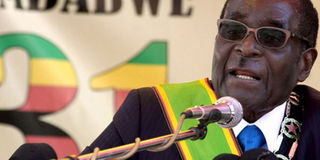Breaking News: At least 10 feared to have drowned in Makueni river
IMF rejects Zimbabwe loan request

Zimbabwe President Robert Mugabe. In January, he increased civil servants’ pay by 14 per cent as he had promised during last year’s polls. PHOTO | JEKESAI NJIKIZANA |
What you need to know:
- Mugabe feels the heat after increasing civil servants’ salaries by 14pc early this year
- Assistant Director for Africa Domenico Fanizza told the BBC new loans were out of the question.
Washington DC, Saturday
The International Monetary Fund has said it will not lend more money to Zimbabwe, because the country is in arrears on repaying previous loans.
The fund’s specialist Africa team is in Harare finalising a programme to help the government revive its stricken economy, with full details to be released next week.
Assistant Director for Africa Domenico Fanizza told the BBC new loans were out of the question.
“We cannot in the current situation, because Zimbabwe runs arrears with the Fund and also other institutions like the World Bank and African Development Bank,” he said.
Mr Fanizza also expressed concern about the government spending more than three quarters of tax revenues to pay the salaries of more than 250,000 workers employed by the state.
“The country, to grow, needs investment. This does not happen. There is no money, there is not enough support and all the money that is generated through tax collection goes into paying the wages,” he told the BBC World Service’s Business Update programme.
Zimbabwe’s Finance Minister Patrick Chinamasa has admitted dealing with the issue will difficult.
“I am embarrassed that our wage bill is some 76 per cent of whatever revenue we receive. It’s not good, it’s not sustainable,” he said.
“We have to create the necessary political climate, build consensus in order to tackle the issues. I can assure you that we are working on this issue,” Mr Chinamasa said.
RAISED SALARIES
President Robert Mugabe raised salaries for government workers by 14 per cent early this year, keeping promises made in the run-up to last year’s election. It is feared any move to reverse that would provoke unrest among well paid civil servants.
On Thursday, addressing the United Nations in New York, President Mugabe criticised the EU and US.
“Because Zimbabwe has thus been pre-occupied with the empowerment of its people economically, she has become a victim of the evil machinations of Western countries, namely the United States of America and the European Union, who continue to apply unilateral and illegal sanctions as a foreign policy tool to achieve short-term political objectives, particularly regime change,” he said.
In a reference to Washington and Brussels hoping for a change of government in Harare he said: “Regime change is a diabolical, illegal policy of interference in the domestic affairs of my country and no good can come from undermining our economy, or depriving our citizens of the necessities of life.”
The country is still recovering from the collapse of its economy. Hyperinflation made the Zimbabwean dollar virtually worthless and led the nation to adopt the US dollar as its unofficial currency.





